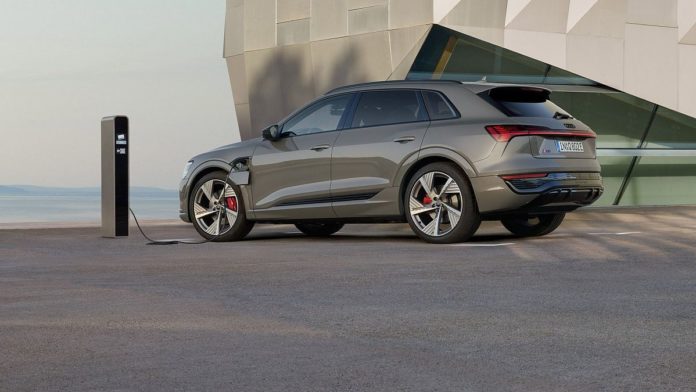Audi’s Brussels plant is assembling an 80,000 euro electric SUV, which turns out to be too expensive for Europeans. After 2025, production will probably relocate to Mexico. Workers and unions are not happy.
The case of this car factory in Belgium that has cutting-edge and low-emission technologies, and has been active since 1949 in the production of Volkswagen models, now seems to be an accurate indicator of a trend that is already underway:
European plants that produce electric cars are too expensive compared to EU market demand.
A factory in decommissioning
For this reason, Audi will stop production and this plant, which is in the municipality of Forest, will be sold.
As the factory’s communications director Peter D’hoore explains to Euronews, there are two choices: either convert the factory for the production of other Volkswagen group models and components or sell it to other car brands. Both are complicated, because the proposals received do not meet the expected standards or criteria set by Volkswagen for potential buyers.
“Only one potential investor has agreed to rework his offer and now he will have some time to do so. It is important to us that as many people as possible remain employed at this site,” says D’hoore, without specifying where production will be relocated.**
Audi in Brussels employs 3.000 people, plus another thousand in related industries, and the unions are on a war footing: they are asking the company to sell not to the highest bidder, but to those who will guarantee the greatest number of jobs.
After the one that paralyzed the city of Brussels on September 16, unions threatened with more strikes and protests.
They criticize the strategies of the European automotive industry, which in the transition to electric has focused on large and expensive models, not within the reach of ordinary people: the list price of the Q8 e-tron electric SUV, Audi’s flagship model built in Forest, is around 80.000 Euros.
“Car manufacturers wanted to make big profits with electric vehicles right away and did not accept that the transition phase would generate fewer dividends and profits,” Hillal Sor, a trade unionist at Metallos FGTB, told Euronews.
“So they bet everything on large, very luxurious, very expensive models that European citizens cannot afford. And so now in Europe we have overproduction, and that’s why groups like Volkswagen want to close factories in Belgium and Germany.”
The sales figures seem to prove him right: in the first eight months of 2024, 902 thousand electric cars were purchased in the European Union, which represents only 12.6% of the total. Petrol cars, on the other hand, remain best-sellers.
Crisis and (possible) solutions
But the perspective of the Belgian unions is not to slow down the ecological transition and return to producing only cars with combustion engines. Rather, they are asking for more public funds for the sector, as emerged from a table in which various trade unions discussed with four MEPs from the European Socialists and Democrats group.
The first plenary session in October at the Eurochamber in Strasbourg will discuss the crisis in the automotive sector and its possible solutions, includingtariffs on Chinese electric cars, which are much cheaper than European ones, and investment projects that are somewhat difficult to realize.
“We really need a much more ambitious reindustrialization plan. Not only through tariffs and protectionist measures,” Belgian MEP Estelle Ceulemans, one of the four visiting the Audi plant, told Euronews.
“To really encourage European and foreign companies to invest and create quality jobs, we will need to intervene on the tax aspect, but also on the training of workers and on the research and development of new technologies”.


